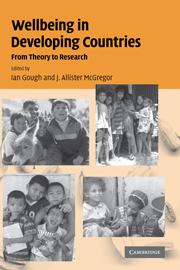Book contents
- Frontmatter
- Contents
- Figures
- Tables
- Notes on contributors
- Acronyms
- Preface
- Introduction
- 1 Theorising wellbeing in international development
- Part I Human needs and human wellbeing
- Part II Resources, agency and meaning
- Part III Quality of life and subjective wellbeing
- Conclusion: researching wellbeing
- 13 Researching wellbeing across the disciplines: some key intellectual problems and ways forward
- 14 Researching wellbeing: from concepts to methodology
- References
- Index
13 - Researching wellbeing across the disciplines: some key intellectual problems and ways forward
Published online by Cambridge University Press: 22 September 2009
- Frontmatter
- Contents
- Figures
- Tables
- Notes on contributors
- Acronyms
- Preface
- Introduction
- 1 Theorising wellbeing in international development
- Part I Human needs and human wellbeing
- Part II Resources, agency and meaning
- Part III Quality of life and subjective wellbeing
- Conclusion: researching wellbeing
- 13 Researching wellbeing across the disciplines: some key intellectual problems and ways forward
- 14 Researching wellbeing: from concepts to methodology
- References
- Index
Summary
[It] is generally not possible to ask all the interesting questions about any really significant phenomenon within the same theory or even within a set of commensurable, logically integratable theories. Noting this was one of the breakthroughs of modern physics, linked to the theory of relativity.
Calhoun 1995: 8Introduction
Social science research into poverty, inequality and wellbeing has usually been conducted on a mono-disciplinary basis. The little cross-disciplinary research there has been has tended to take place within policy-related fields of study such as social policy and development studies, although even here true collaborations are rare. Since the early 1990s I have been involved, as a sociologist, in the theoretical and empirical study of poverty and related issues in Ethiopia and Uganda, and Africa more broadly. During this time I made a number of attempts to work with economists on these issues, recognising the potential synergies which could result from an interaction of the expertises. My failure to achieve a cross-disciplinary relationship with development economists is not unique, and I became interested in the underlying reasons, in particular in understanding the extent to which these are intellectual, rather than institutional, political and historical. This extended into a more general interest in cross-disciplinary collaboration, and, given the power of Sayer's argument for post-disciplinary approaches to ‘concrete’ issues, I was driven to enquire why there has been so little cross-disciplinary collaboration in researching poverty in developing countries:
While all disciplines ask distinctive and worthwhile abstract (i.e. one-sided) questions, understanding concrete (i.e. many-sided) situations requires an interdisciplinary, or better, postdisciplinary approach, which follows arguments and processes wherever they lead, instead of stopping at conventional disciplinary boundaries, subordinating intellectual exploration to parochial institutional demands.
(Sayer 1999: abstract)- Type
- Chapter
- Information
- Wellbeing in Developing CountriesFrom Theory to Research, pp. 283 - 315Publisher: Cambridge University PressPrint publication year: 2007
- 11
- Cited by



